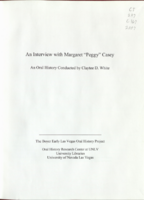Search the Special Collections and Archives Portal
Search Results

Danny Cluff oral history interview: transcript
Date
Archival Collection
Description
Oral history interview with Danny Cluff conducted by Claytee D. White on December 8, 2017 for the Remembering 1 October Oral History Project. In this interview, Danny Cluff discusses his attendance at the Route 91 Harvest music festival on the evening of the October 1, 2017 mass shooting in Las Vegas, Nevada with his friends and nephew. He talks of finding safety in Hooters with other survivors from the concert. When speaking of gun control, he discusses his perspectives on human nature, citing his experiences during and after the concert shooting. Throughout the interview, Cluff speaks of the ways he has healed and kept positive after the shooting, such as laughing through the hard times and writing poetry, of which he gives a few samples.
Text

Alan Stock oral history interview: transcript
Date
Archival Collection
Description
Oral history interview with Alan Stock conducted by Barbara Tabach on December 27, 2017 for the Remembering 1 October Oral History Project. In this interview, Alan Stock discusses moving to Las Vegas, Nevada in 1999 for his job as a radio talk show host for KXNT. Stock describes the broadcast that covered the October 1, 2017 Las Vegas mass shooting from 11 PM on that night until 9 AM the next morning. He talks about some of the calls the station received from various members of the community, including survivors of the shooting, families of those at the event, people on lockdown in the nearby hotels, doctors, and general listeners. Stock describes some of the topics discussed on the broadcast, such as what was currently happening on the Las Vegas Strip, stories of the aftermath, and the support needed from the general public. Other topics include gun control and conspiracy theories. He discusses the impact this and other shootings would have on public affairs, including tighter security in daily living and public gatherings. He compares security in the United States to security in Israel and other countries, focusing on the idea of unconcealed guns worn in public. Throughout this interview, Alan Stock explains that the radio station's goal was to provide accurate information to the public during the aftermath of the October 1, 2017 mass shooting.
Text
Helen Manix oral history interviews
Identifier
Abstract
Oral history interviews with Helen Manix conducted by Art Rader on October 29, 1974 and November 01, 1974 for the Ralph Roske Oral History Project on Early Las Vegas. In the interviews, Helen Manix discusses moving to Boulder City, Nevada in 1939 with her husband, John Manix, to operate a general merchandise store. Helen Manix and her son, Joseph "Joe" Manix, Jr., also discuss their local community, Boulder (Hoover) Dam, and their experiences in Boulder City during World War II.
Archival Collection
Mary Ellen Osborn Lake and Thomas Lake oral history interview
Identifier
Abstract
Oral history interview with Mary Ellen Osborn Lake and Thomas Lake conducted by Fred Wilson on February 18, 1951. Mary Ellen discusses arriving in Las Vegas, Nevada in 1904. The Lakes talk about the first Methodist churches in Las Vegas, their involvement, and members of the church community.
Archival Collection

Transcript of interview with Ann K. Johnson by Wanda Cortés, March 3, 1980
Date
Archival Collection
Description
On March 3, 1980, Wanda Cortés interviewed University of Nevada, Las Vegas counselor, Ann K. Johnson (born August 28th, 1954 in Garland, Arkansas) about her life in Southern Nevada. The two discuss Johnson’s educational and occupational history. The interview concludes with a discussion on the population’s rapid growth during the seventies.
Text

Transcript of interview with Peggy Casey by Claytee D. White, January 13, 2005
Date
Archival Collection
Description
Text
Robert W. Bugbee oral history interview
Identifier
Abstract
Oral history interview with Robert Bugbee conducted by John Lopez on March 16, 1981 for the Ralph Roske Oral History Project on Early Las Vegas. Bugbee discusses his move to Las Vegas, Nevada in 1953 and how both the population and housing have changed since then. Bugbee additionally speaks about the changes in infrastructure, including the building of roads and increased air travel. Throughout the interview, he mentions some of the various specific housing tracts that were built throughout Las Vegas. Bugbee also mentions topics such as the building of Hoover Dam, the first popular casinos in town, the Carole Lombard crash, and the MGM Grand fire. The interview finalizes with Bugbee’s thoughts on the future of Las Vegas.
Archival Collection
Don Payne oral history interview
Identifier
Abstract
Oral history interview with Don Payne conducted by Mara E. Vernon on March 19, 1997 for the UNLV University Libraries Oral History Collection. In this interview, Payne discusses his career with the Las Vegas News Bureau. He talks about his role as Head of the Bureau and his work in promoting Las Vegas through media outlets. Payne remembers the Bureau’s partnership with the Union Pacific Railroad and the beginning of corporate ownership in Las Vegas hotels and casinos.
Archival Collection
Paul A. Beach oral history interview
Identifier
Abstract
Oral history interview with Paul A. Beach conducted by William Gekakis on February 17, 1976 for the Ralph Roske Oral History Project on Early Las Vegas. During this interview, Beach discusses housing, physical boundaries of the city of Las Vegas, Nevada, the airport, church, and transportation. Beach also discusses tourist recreation, the economy, Nellis Air Force Base, the Las Vegas Strip, industries, presidential visits, the Korean War, atomic tests, and the educational system.
Archival Collection
Linda Hartley oral history interview
Identifier
Abstract
Oral history interview with Linda Hartley conducted by Pauline Marchese on March 10, 1978 for the Ralph Roske Oral History Project on Early Las Vegas. During the interview, the two discuss Hartley’s personal history, such as schools that she had attended and her recollection of local recreational activities. The two go on to talk about changes in crime, the environment, and briefly discuss a variety of issues at the time, including: segregated schools, prostitution, and effects of the Nevada Test Site.
Archival Collection
